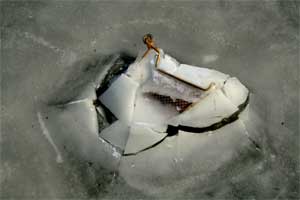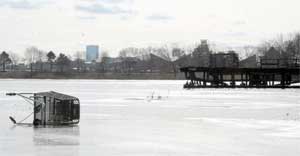Andrew Firestone Hikers along the eastern bank of the Mystic River might be ogling more than they bargained for recently. Spurred by comments made at a recent Board of Alderman meeting by Alderman-at-Large Dennis Sullivan, The Somerville News discovered the presence of dozens of aluminum shopping carts littering the bottom of the river. Looking out over the Wellington Bridge may inspire some to remember the famous ending scenes of poignant film "Mystic River" which showcased the very location. Looking down, however, presents the eye with an altogether different sensation: submerged, for the entire length of the 200 yard bridge, are dozens, possibly as many as a hundred, shopping carts rusting in the river. The river is seemingly saturated in shopping carts, presenting a notable blemish to the area. Sullivan, who brought the situation to the attention of his fellow Aldermen, spoke about finding the source of the problem. Examining some of the carts, Sullivan noted that several of them came from a local Kohl's store, on the other side of the bridge in Medford. |
|||||||
Pointing out the ordinance in Somerville which requires all stores that have shopping carts install locks to limit their movement away from the stores, Sullivan guessed that most of the carts not only came from Medford, but also that they might not have a similar law. "I want to challenge Medford to adopt the same ordinance that we have so we wouldn't have this stuff happening," Sullivan said. He has since sent a copy of the ordinance to his counterparts in Medford.
As far as the situation with the carts is concerned, the Mystic River Watershed Association has expressed interest in cleaning up the river, noting several clean-up jobs over the last few decades, since at least the 1970s. "Every generation has their bad kids. I shouldn't say bad, perhaps stupid might be better," said Patrick Johnston, a board member of the MRWA who several years ago helped organize a similar clean-up in Everett. Espousing a plan of using boats and grappling hooks to fish the carts out, Johnston also noted the limited power of his own, mostly volunteer organization. "We rely on people's donations in order to fund our activities," he said remarking that the shopping carts were only the "tip of the iceberg" in terms of threats to the river. "If we can find the resources to handle it, then we will." Executive Director of the MRWA EkOngKar Singh Khalsa called it a "great disappointment" and hoped to organize a clean-up effort for the spring.
An EPA taskforce member, who wished to remain anonymous, echoed another of Johnston's concerns: the lack of proper jurisdiction in dealing with the problem. "[The Municipal] Department of Public Works and Watershed groups are responsible for maintaining the banks," he said. "It's more akin to litter, but when you have a massive accumulation of litter, then it becomes an eye-sore." He noted that often, cities and towns have to suffer the cost of removal, and also brought to light other solutions. For instance, in Worcester, stores that lose their carts are required by law to be responsible for them, and must pick them up wherever they are. The official also noted the prevalence of illegal dumping along the many miles of the Mystic River.
Sullivan points to the State Department of Recreation and Conservation, and claims that the state has not done enough to fight or even recognize the problem. "We haven't had a routine maintenance schedule for dealing with this," he said, adding "That's a beautiful area, a natural resource that the people of Somerville use all the time. When you see that many things in the water like that, as a local state official that tells me that someone isn't doing their job."
Johnston on the other hand, echoing the old economics problem of "The Tragedy of the Commons," believes that "ultimately, we all have some responsibility." Considering the rapid change from industrial area to parkland, Johnston pointed to a "lack of education and awareness about our river." "Only over the last ten or twenty years has some green space been created," Johnston said. "People don't have a sense that they are stake-holders in this. Our toughest mission is making people realize they have something of value, and then care about it, and do something about restoring it and protecting it."
The Mystic River Watershed Association is currently organizing a cleanup for the Spring. Please e-mail contact@mysticriver.org or call 781-316-3438 for more information.














Reader Comments